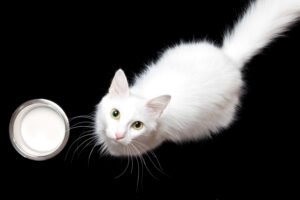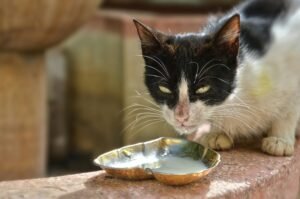Is Cow's milk good for Cat?
Milk is a good source of protein and minerals, as we all know. But when it comes to cats drinking milk, there are some things you need to be aware of. This article is all you need to know about cats drinking milk, including the advantages, disadvantages, and more on.
Since childhood, we’ve been inundated with stories and images of cats drinking milk, but in real life, that’s not always the case. From birth to the kitten stage, cats’ bodies produce an enzyme named “lactase,” which helps them digest the lactose in milk. As they grow older, the production of this enzyme decreases, and they can develop lactose intolerance. Some cats that drank milk regularly as kittens can continue to digest it, but many can’t.

Which milk is acceptable.
For kittens, the ideal food is their mother’s milk or, in its absence, artificial formulas from pet stores. There is a good reason why milk is good for kittens: it’s their mother’s milk. Mother’s milk helps kittens grow faster and stay healthier. It also helps them resist illnesses and socialize better.
Which milk is unacceptable.
Cow’s milk has a different composition from cat’s milk, and cats can suffer from nutritional deficiencies and gastric issues by drinking cow’s milk.

How to Know if Your Cat Doesn’t Tolerate Milk ?
Here are some symptoms that might indicate your cat is lactose intolerant:
1. Vomiting
2. Diarrhea
3. Gas
4. Nausea
6. Abdominal swelling
7. Farting
If these symptoms occur after your cat drinks milk, it’s likely lactose intolerant, so do not provide your cat with milk.

How to Know if Your Cat Is Allergic to Milk ?
Here are some symptoms that might suggest your cat is allergic to milk:
1. Itching
2. Coughing
3. Vomiting
4. Breathing difficulties
5. Stomach aches
Consult with a veterinarian if you notice these symptoms in your cat after drinking milk.
In conclusion, while milk has traditionally been associated with cats, it should not be the sole basis of their diet. Cats require animal protein and fat as the foundation of their nutrition. Although specific types of milk, like mother’s milk or specially formulated kitten milk, can be beneficial for kittens, they are not suitable for adult cats. As cats grow, many develop lactose intolerance or even allergies, making milk potentially harmful. To ensure a cat’s health and well-being, provide them with a balanced diet designed for their specific life stage and nutritional needs. If in doubt, consult a veterinarian for guidance.

